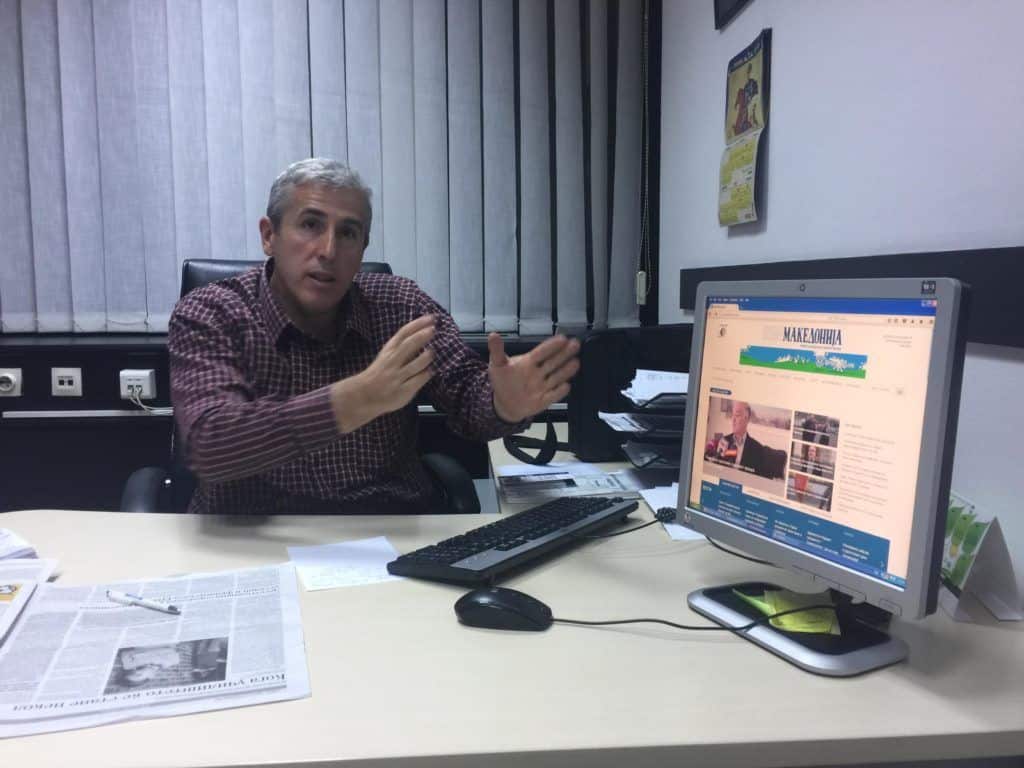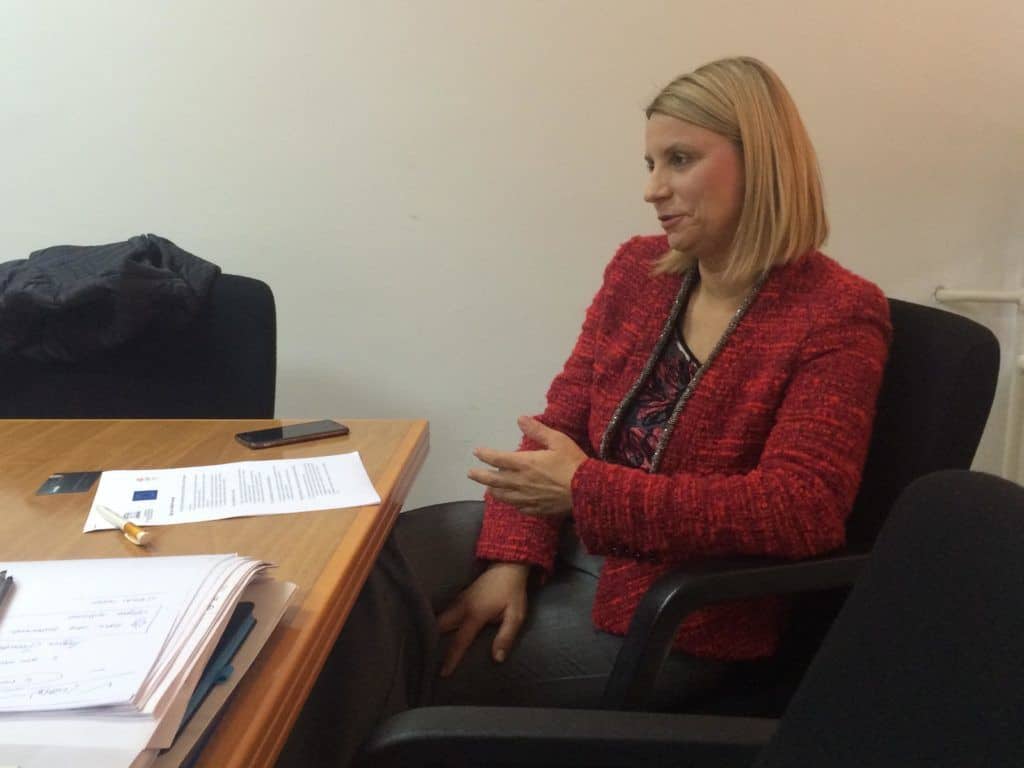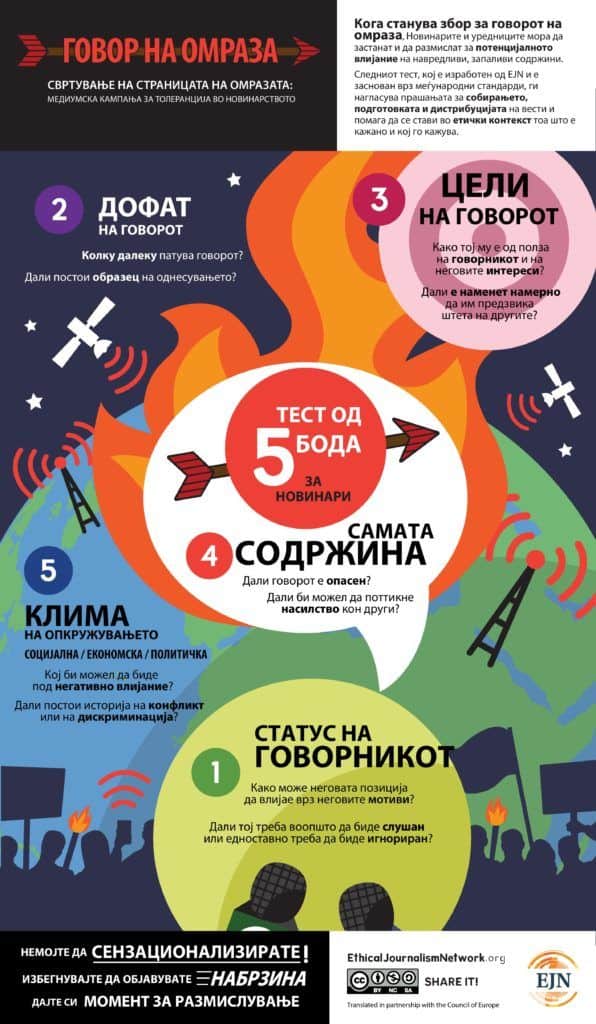Macedonia: Building Trust in the “home” of fake news
As part of the EJN’s Building Trust in Media in South East Europe and Turkey programme EJN board member Bernt Olufsen visited Skopje to meet with media owners and editors to discuss how they can improve their governance and self-regulatory processes.
Bernt Olufsen
Just before dawn I woke up to the prayer from the old mosque. Through my window I saw blue light encircling the top of the minaret, 30 metres above the ground. From the hill opposite you can see a great enlightened cross – the 66 metre tall Millennium Cross – as a monument to over 2,000 years of Christianity.
The contrasts are eye-catching in the Macedonian capital, where blind conviction in communist ideology seem to be replaced by religion and feelings of nationalism.
Skopje is called a capital of kitsch. Here Alexander the Great is enormous, sitting high on a horse statue 22 metres above the ground. The surrounding buildings have artificial facades in Roman style. There are beautiful bridges and a triumphal arch. The government building wears a fake facade. It’s like scenery from Hollywood. The streets are occupied by red, double-decker London buses.
Perhaps not so strange then, that Macedonia is also host to the world’s so-called “Capital of Fake News”, the small town of Veles, just 40 kilometres outside Skopje. Here young Macedonians, some of them poor with limited job prospects, have been trying to get rich at the expense of Western democracies by spreading false information via the internet and earning money from advertising. Their exploitation of technology and Facebook’s business model have made them world-famous, if not notorious.
I am in Macedonia on a mission for EU and UNESCO, as a contribution to a stronger and more independent position for media in the Western Balkan countries. As a representative of the Ethical Journalism Network (EJN). We run a project Building Trust in Media in the Western Balkans and Turkey.
In Skopje we meet representatives from different kind of media: newspapers, radio, TV and online news portals. And people from different media organizations and educational institutions. Together with Serbian-born journalist, Danica Ilic from EJN, we will meet them separately and at a conference hosted by European Union Info-Centre in Skopje. Here my task is to talk about the Norwegian system of self-regulation within media, and how Norwegian media companies are trying to open up, and become more transparent to the public. In Norway media publish annual and detailed editorial reports, which include both mishaps and success stories.
A good functioning complaint system and ethical rules that are respected by all professionals do not seem to be present in Macedonia. Media economics are lousy, there is strong political pressure on media and no one seems to respect statements from The Press Council.
“Here you will find both chaos and anarchy within media,” according to the Albanian editor of daily newspaper KOHA, Lirim Dullovi. He is also one of the two owners of the company.
Now he is engaged in the founding of a new organization for print publishers in Macedonia. His newspaper has a daily circulation of 7,000 copies, but still is one of the leading media outfits in this country, together with three other dailies. Around 25 per cent of the people in Macedonia are Albanians.
The newspapers are not modern, but they have their own online news portals. These are low budget portals, with a minimum of staff, publishing stories from the print newsroom. Their economic resources are very limited, and Lirim Dullovi highlights a story about unfair competition in the advertising market. State advertising is a big share of the market, and government-friendly media are given priority for state and official ads, regardless of their position in the reader/viewer market.
Perhaps no country suffers from the spread of fake news as much as Macedonia itself. The recent local elections where disturbed by the toxic atmosphere created by online sites trying to manipulate the electorate with false information. Macedonia has more than 300 online news portals, of which less than 20 are considered reliable. As far as the rest are concerned, no one really knows who are the editors or owners.
“Regulation by Law of the online market should be our number one priority,” says Aleksandar Damovski, founder and editor-in-chief of the news portal MKD.
The second priority is the need for a better copyright protection of journalistic material. Today all content can be stolen and twisted by unscrupulous online operators with no known owner. Until these elementary factors are dealt with we cannot talk about efficient self-regulation of media says Damovski.
MKD is a pure online newspaper with 11 journalists and 50,000 daily unique visitors. Damovski reminds us that many media brands are financed through grants from charities and institutions demanding political payback or they represent foreign interests.
Even if the political power changed hands in Macedonia two years ago, the pressure on media continues. Media that supported the previous regime have turned with the winds of change and now are open to manipulation by the new establishment rather than playing the role of critical opposition.
The independent Press Council is regarded by many as “unknown” or without any real impact. The Council was established with the help from UNESCO only three years ago, and according to its director it is still work in progress.

GOING ONLINE: Chief editor Aleksandar Dimkovski demonstrates the digital version of his «HOBA Makedonia».
“The statements from The Press Council are not mandatory, and there is no order for corrections or apologies”, says Aleksandar Dimkovski, the chief editor of Macedonia’s oldest newspaper HOBA Makedonia. The newspaper was born after the liberation of Yugoslavia in 1944, and for many years was a herald for President Tito – who still has his gold plated statue in the center of Skopje.
Like other editors in the city Dimkovski is a warm supporter of new and more detailed regulation of media by law. The regulation should include television, which takes a huge part of the advertising market. He and his private sector colleagues are strongly critical of how public service channels receive funding both from state and from advertising revenue.
“There is a total lack of transparency in the funding of TV channels,” says news editor Biljana Georgijevska from the privately owned TV 21.
Macedonia has seven national TV channels, organised in a business association, but there is, she says, a total lack of solidarity and common action when it comes to the creation of a new basis for regulating media. That is also why so many unprofessional online operators get away with their falsehoods and malicious lies.
However, Macedonian television plays an important role in politics. Several channels have political talk-shows and political debates. But some well-known hosts also have close links to political parties or the government. As a result, prior to recent elections some parties refused to take part in the debate shows.

CRITICAL- News editor Snezana Lupevska in TV Telma.
“Today legislation will indirectly allow leaders of political parties to be the real owners behind two of the country´s most popular TV channels,” says news editor Snezana Lupevska in the private TV Telma. She says political pressure is the biggest challenge for independent and critical journalism.
-“The other day our new Minister of Finance declared that all journalists lack competence to understand and analyze the national budget in their reporting,” she said. She also criticises the Ministry of Information, with its 40 so-called experts, over its lack of cooperation with media.
But the state broadcaster MRT is in the midst of financial crisis. The new government terminated its license funding from September 1st. It wasn’t much in the first place – just 2, 50 Euro per household a month – but the loss has considerable impact. Now they are negotiating whether they can receive direct state funding or around 0,5 or 1 percent of the national budget of 3,44 billion Euro.
“Anyway, it will not be sufficient to cover our bills,” says Martin Pushevski, news editor of state television channel MTV. He explains that the organisation is overstaffed, with some 860 employees, many of them without skills to work in the new digital landscape. MTV is located at the giant broadcasting headquarters situated close to the government complex of Skopje. Some sources told us that it used to contain 2,000 employees.
The director of MRT is appointed by a board which is directly elected by Parliament. This will give the governmental parties a total control over state broadcasting, and management can be replaced after every election. Today’s management are waiting to know their fate and expecting the sack, according to leading media people we spoke with in Skopje.
However, Martin Pushevski, who has for a long time served as a popular news anchor, seems to be sitting safe in the chair of the news editor. “There is a problem of too many media operators in Macedonia, compared with the funding from the market. Fewer media companies and bigger resources would give us a higher quality in journalism,” he says.
Like so many other media leaders, Pushevski wants to stress for us the need for education and digital skills in the industry, most important when it comes to multimedia publishing platforms.

During our meetings with media people and representatives of institutions and academia at the EU Info-Center, we were told that Macedonia still has no association of editors. Most media people are organised in two separate journalist associations, which represent different political currents. There may be an opening here for an independent association representing open editorial government of media, and for editors who can be a professional bridge between owners of media and the newsrooms where journalism is performed.
Many media people have long experience of well-meaning conferences and idealistic initiatives from media support groups and the international community. All of them aim to create a better landscape for Macedonian media, but much of this goodwill fails because of few concrete efforts for follow up and to strengthen the field of journalism.
In these circumstances the Ethical Journalism Network can be a change-maker. With the right resources, and building on the network of professional goodwill on the ground it should be possible to establish a constructive dialogue between all players and organisations. That should take Macedonia out of the shadow of “fake News” and into the brighter and more democratic world of transparent and reliable information.
Bernt Olufsen is an EJN Board Member and former Editor in Chief of VG in Norway. Read the original blog in Norwegian.
Main photo: EU CONFERENCE: Danica Ilic and Bernt Olufsen, representing EJN in meeting with Macedonian media people at EU Info-Center in Skopje.